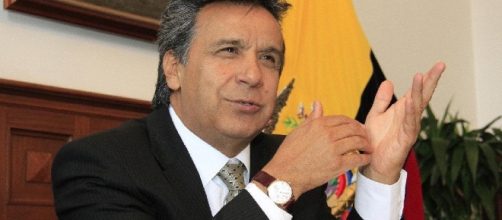Left candidate Lenin Moreno came out on top in Sunday's first round of presidential elections in Ecuador. He is ahead of his right-wing opponent, Guillermo Lasso, to succeed Rafael Correa, according to partial results. Former Vice President Lenin Moreno, a candidate of Alliance Country (AP), the ruling party in Ecuador, arrived at the top of the first round of the presidential election on Sunday, 19 February. He would approach the victory against his right-wing opponent, Guillermo Lasso, in the race for the successions of Rafael Correa, according to partial results.
NEC announced the partial results
Lenin Moreno collected 38.87% of the votes against the former conservative banker Guillermo Lasso of the Creo des opportunities (Creo) movement, credited with 28.50%, according to the results of 81.90% of the votes cast and communicated by the National Electoral Council (NEC).
Lenin Moreno vs Guillermo Lasso:
To win in the first round, Lenin Moreno, 63, has to get 40% of the votes cast and a 10-point lead over his closest rival. He would avoid the second round on April 2, where his rival could gather the different factions of the opposition. The president of the CNE, Juan Pablo Pozo, recommended to "wait for the 100% count" of the ballots scheduled for Monday at midday, before confirming a victory or a second round.
'We will win this battle' says Lenin
"We are going to win this battle," said Socialist Lenin Moreno in the evening, to the cheers of a jubilant crowd at the headquarters of his party in Quito. After the closure of 43,600 polling stations, Guillermo Lasso, 61, who was in Guayaquil (southwest), the economic capital of the country, said he was certain that "there would be a second round."
The successor of Rafael Correa
Some 12.8 million voters had to vote, under penalty of a fine, to designate the successor of Rafael Correa among eight candidates. After three mandates and ten years in power, the charismatic but controversial head of the outgoing state will leave a modernized country with reduced social inequalities but polarized and plagued by the economic crisis.

